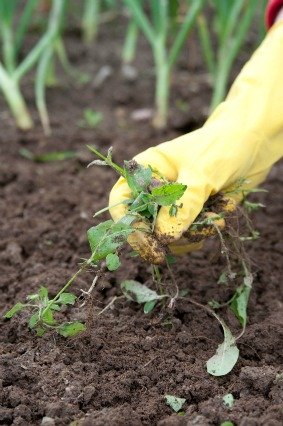Garden Weeds
What are garden weeds, and how do I get rid of them in my garden?
Actually asking what is a weed is not that unusual. Someone once said "weeds are simply plants that are growing where they do not belong."
And for us vegetable gardeners, they do not belong in our garden, our driveway, or anywhere on our property. But as sure as the sun will rise each day we can be sure that after the first spring rain arrives so will the weeds.
What Kind of Weeds Do You Have?
Weeds are usually classified as an annual, biennial, or a perennial and are as follows:
- Annuals
Complete their growing cycle in a year or less. They should be destroyed before they go to seed and spread.
Biennials
Usually have a two year cycle but produce seeds and flowers during the second year. It's best to destroy this type of weed in the first season to prevent maturity to flowering and seeding.
Perennials
Live more than two years and are a deep rooted weed. Therefore, it is important to not only destroy the top layer but dig down and be sure to get all of the root system.
If you only remove the top layer, the remaining root will store enough food energy to grow again the following year. Speaking of roots, no matter what type of garden weeds you have, always make sure you kill or remove the root system.
Now that we have identified the type of weeds we do battle with we need to know what to do to rid ourselves of them.
Start with Preventative Maintenance


Garden weeds don't need our help to grow; they do quite well on their own. You can relieve yourself of as much misery as possible by doing a little
preventative maintenance.
Here is a list of good habits that should become part of any vegetable gardener's routine:
Act the moment you see the first weed, the quicker you respond the fewer there will be.
Make sure any soil you bring into the garden is weed free.
Mulch where possible (we will discuss this later).
Use proper bending and kneeling methods to protect your back.
If you use chemical herbicide, handle with care and follow the manufactures instructions.
And, use common sense.
How to Remove and Control Garden Weeds


If your vegetable garden is a small to medium area, hand weeding is probably the best and most effective means of weed control. There are several tools available to aid you in your weed removal such as a garden fork, cultivator, spade, or Dutch hoe.
I find hand removal of garden weeds much easier after a day of rain. Those weeds that were previously stubborn to hand
removal before, come out with ease using a spade or garden fork.
The ground is damp allowing the tool to slide into the soil with ease and slip under the root.
However, do be careful not to strain your back. Use common sense and work one small patch at a time over several days. If bending is a problem try a round-edge shovel instead of a spade or garden fork. Use your foot on the upper edge of the shovel and apply a downward pressure.
Don't forget to visit My Gift Shop.
After browsing my Gift Shop, you will see a link that will take you back here where left off reading.
Three Methods to Kill Garden Weeds
There are three methods that can be used to kill garden weeds; mechanical weeding, organic weeding, and chemical weeding.
Mechanical Weeding
This is a hands on approach that is probably the simplest and most effective way of weeding, although it can be as one would put it; a "back-breaker." If you have a small garden area this method will work fine. I can't deny it's tough slugging, but it does offer an added bonus, your body will get a little exercise. "Hey!... We got to find a little something positive somewhere in this dreaded task."
If your garden is larger and you are ambitious, another effective mechanical weed removal method is the use of a power tool such as a garden tiller or cultivator. A good cultivator can be a little pricey to purchase but can be rented. Check with Lowe's or Home Depot to see if this option is available in your area.
When the soil is cultivated and all the weeds removed, use a little diligence and check for new growth of garden weeds over a ten day time frame. Because the soil is loose due to cultivating, any new weed growth will come out with little resistance.
I know this is a tedious job, but nothing about garden weeds is a fun process. Once your garden is weed free, you can relax and enjoy the pleasure your vegetable garden will give you throughout the growing season.
Organic Weeding
The following are some creative and effective methods to kill garden weeds and are worth trying.
- Boiling Water
Pour boiling water on garden weeds to kill the weed and any seeds that are ready
to germinate. Be careful not to splash yourself as it's the weed you want to destroy not harm yourself. I know some vegetable gardeners may not think of it, but if you use this method do so when young children are not around to prevent them from imitating your action later on. - Soapy Water
Add about five tablespoons of liquid dish soap to four cups of water and pour the solution into a spray bottle. For best results spray garden weeds on a hot day when they are most susceptible to dehydration, and continue to spray for the next several days to prevent any weed survival. I must admit, I have tried this method with little success, however, I have heard many people swear by it. My advice is to give it a try and if it doesn't work, you can try any of the other alternatives. - Vinegar Spray
Fill a spray bottle with full strength vinegar and as with the soapy water method, continue to spray for the next several days until you are sure the weeds are destroyed. - Alcohol Spray
Mix five tablespoons of alcohol to four cups of water and pour the solution into a spray bottle. For best results, spray weeds and repeat the process for several days or until the weed wilts.
Garden Tip
When you use weed control, be careful not to spray your plants. It's the garden weeds you want to kill, not your vegetable plants. - Cornmeal Gluten
Not only is it effective on garden weeds it also adds nitrogen to the soil. Cornmeal gluten can also be used for weeds growing on your lawn and it won't damage the surrounding grass.
Garden Tip
Keep your lawn well manicured by mowing regularly to prevent weeds from flowering and producing seeds. And don't use a weedwacker to remove weeds especially if they have flowered.
Other Organic Methods to Control Garden Weeds
- Mulching
Not only does mulching keep soil moist and cool in summer it also has the added benefit to block out sunlight and smother weed seedlings before they grow and spread. A layer of organic mulch such as wood chips, shredded bark, or pine straw spread several inches thick is recommended for best results.
Although mulch will discourage and suppress weed growth, seeds will continue to grow in the top layer of the mulch. Be vigilant watch out for seed germination and remove any new weeds as soon as possible. Fortunately they can be removed by hand very easily. - Newspapers
Prevent light from reaching the emerging weed. Spread newspaper at least eight or nine layers thick near and around your vegetables. If you have the ambition, cover as much of your garden as possible, than add a top layer of mulch two to three inches thick to hide the newspaper and give your garden an attractive appearance.
Garden Tip
The use of newspapers and mulch is a great way to suppress and kill garden weeds. Unlike the use of chemicals, once the weeds are gone you can plant extra vegetables by moving the mulch aside and plant through the newspaper. - Synthetic Weed Blocker Material
A cloth like material that allows water and air to pass through while blocking light that weeds need to flourish. It can be purchased in rolls of different widths and length, and can be easily cut to size with a pair of scissors. The material also comes with anchors to secure the weed blocker to the ground. Add a 2 or 3 inch layer of wood chips or pine straw to be more effective in controlling weeds, as well as add a little beauty to your garden.
Garden Tip
Over time weeds may eventually emerge to the surface of any synthetic weed blocker. Should this happen remove the weeds by hand or use an organic or chemical weed spray. The few garden weeds that do manage to come through are easily removed and shouldn't take much of your time. - Black Polyethylene Film
Differs from cloth weed blocker material because it blocks all light, water, and air, from reaching any garden weeds. It is an excellent choice for areas such as pathways and any area where you want nothing to grow.
Again, just cover with mulch to hide the polyethylene film.
Do not use around plants because the polyethylene film traps heat and prevents water from penetrating to your plants.
Chemical Weed Killer
Safety Precautions
Think of chemical weed killing as a last resort. Sometimes it may be your only option, especially if you have a physical disability that impedes your mobility. If this is the case, then do treat chemical herbicides with respect.
When using any form of chemical weed killer, be sure to first read the instructions on the label and follow the manufactures recommended use. Herbicides are poisonous so memorize or write down the telephone number for poison control. Also, use precautionary safety measures and wear protective clothing, gloves, eye goggles, and a face mask to cover your mouth and nose.
Always make sure a chemical herbicide container is clearly marked poison and easy to read, and if there are any left-over chemicals after use, be sure to dispose of the solution according to manufacture instructions.
Last but not least, wash out the chemical sprayer when finished and don't forget to thoroughly wash your hands and any other area of exposed skin. Be sure to store chemicals in a safe place out of reach of children and do not use any container that is not approved by the manufacture.
For some readers this may sound a little like "over-kill," but do keep in mind that is exactly what you are intending to do with garden weeds when using chemical herbicides. Let's not ruin your day by ending up in the hospital for chemical herbicide treatment.
Best Type of Chemicals to Kill Garden Weeds
- There are two kinds of chemicals for weed control, and are classified as pre-emergents and post-emergents.
Garden Tip - Never use a chemical weed killer for any weeds in your vegetable garden. Remember, the idea of vegetable gardening is to eat your vegetables.
- Pre-emergent chemicals
Control and destroy the weeds seed by preventing them from germinating, and hence from growing in the soil. On the other hand, a post-emergent chemical will kill the existing weed but not any weed seedlings located in the soil.
It usually takes about seventy-two hours for a post-emergent chemical to kill existing garden weeds, but be sure to read and follow the manufactures instructions for use of their product.
Garden Tip
When using a chemical spray, cover the area around any existing vegetable or flowers to protect them from receiving any chemical spray or residue, and keep pets away from the area.
Now that the existing garden weeds are destroyed, use a pre-emergent chemical to destroy those weed seeds that still exist in the soil just waiting to germinate and sprout. - Pre-emergent herbicide
Can be purchased in a granular form that can be sprinkled over the garden, while other types are most effective and work best when applied to the top or mixed into the soil.
Always read the manufactures instructions for best results and safety of use. The next time you visit your local nursery, remember to ask one of their experts for advice on which type of pre-emergent herbicides will work best for your garden.
Ask a Nursery Expert
There are many types of herbicides on the market that can be purchased at your local nursery, Lowe's, Home Depot, or your neighborhood hardware store such as Ace Hardware. One of the best chemical manufactures I recommend is Roundup made by Scotts Miracle-Gro. It has no residual effect on the soil and area treated. But to be sure, read the information on the products label. Manufactures may change what is in the solution.
Know the type of weed you wish to kill and make sure the herbicide you purchase will effectively work on that type of weed. It is worth a trip to you local nursery to talk with a qualified nursery expert for advice and use of any chemical herbicide.
Protect Your Back when Working on Garden Weeds
One of the most common problems when working in the garden and most evident when removing garden weeds is poor work habits. Your back is one of your greatest assets so take care of it.
Although there are many techniques I could suggest for bending to work with garden weeds, the best advice I could give is check with your doctor or chiropractor.
I can't stress this point strong enough, especially if you feel healthy and strong. A wrong twist or bend may be all it will take to ruin your garden experience now and in the future.
In closing, I can't think of a better way than to remind you that "an ounce of prevention is worth a pound of cure."
To identify weeds you may have in your garden read weed identification guide.
Before you leave me why not drop in to My Gift Shop for a peek and see if you find something of interest for you, family, or friends.
Happy Gardening
Copyright © 2008-2019 All rights reserved.

